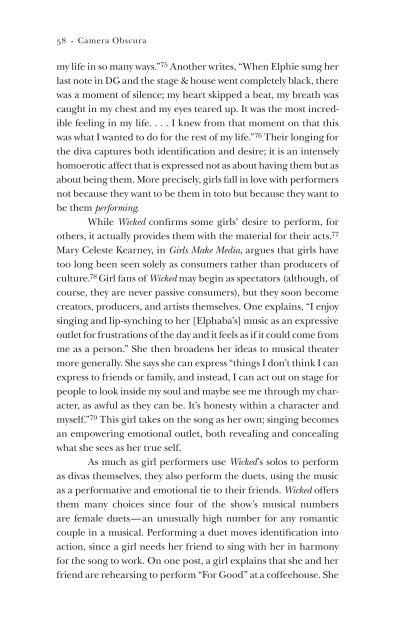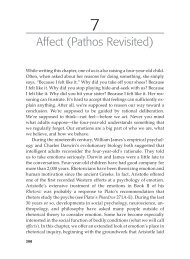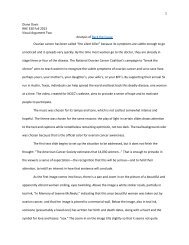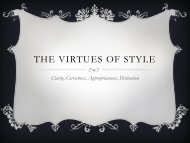(Kristin Chenoweth) and Elphaba - Camera Obscura: Feminism ...
(Kristin Chenoweth) and Elphaba - Camera Obscura: Feminism ...
(Kristin Chenoweth) and Elphaba - Camera Obscura: Feminism ...
- No tags were found...
You also want an ePaper? Increase the reach of your titles
YUMPU automatically turns print PDFs into web optimized ePapers that Google loves.
58 • <strong>Camera</strong> <strong>Obscura</strong><br />
my life in so many ways.” 75 Another writes, “When Elphie sung her<br />
last note in DG <strong>and</strong> the stage & house went completely black, there<br />
was a moment of silence; my heart skipped a beat, my breath was<br />
caught in my chest <strong>and</strong> my eyes teared up. It was the most incredible<br />
feeling in my life. . . . I knew from that moment on that this<br />
was what I wanted to do for the rest of my life.” 76 Their longing for<br />
the diva captures both identification <strong>and</strong> desire; it is an intensely<br />
homoerotic affect that is expressed not as about having them but as<br />
about being them. More precisely, girls fall in love with performers<br />
not because they want to be them in toto but because they want to<br />
be them performing.<br />
While Wicked confirms some girls’ desire to perform, for<br />
others, it actually provides them with the material for their acts. 77<br />
Mary Celeste Kearney, in Girls Make Media, argues that girls have<br />
too long been seen solely as consumers rather than producers of<br />
culture. 78 Girl fans of Wicked may begin as spectators (although, of<br />
course, they are never passive consumers), but they soon become<br />
creators, producers, <strong>and</strong> artists themselves. One explains, “I enjoy<br />
singing <strong>and</strong> lip-synching to her [<strong>Elphaba</strong>’s] music as an expressive<br />
outlet for frustrations of the day <strong>and</strong> it feels as if it could come from<br />
me as a person.” She then broadens her ideas to musical theater<br />
more generally. She says she can express “things I don’t think I can<br />
express to friends or family, <strong>and</strong> instead, I can act out on stage for<br />
people to look inside my soul <strong>and</strong> maybe see me through my character,<br />
as awful as they can be. It’s honesty within a character <strong>and</strong><br />
myself.” 79 This girl takes on the song as her own; singing becomes<br />
an empowering emotional outlet, both revealing <strong>and</strong> concealing<br />
what she sees as her true self.<br />
As much as girl performers use Wicked’s solos to perform<br />
as divas themselves, they also perform the duets, using the music<br />
as a performative <strong>and</strong> emotional tie to their friends. Wicked offers<br />
them many choices since four of the show’s musical numbers<br />
are female duets — an unusually high number for any romantic<br />
couple in a musical. Performing a duet moves identification into<br />
action, since a girl needs her friend to sing with her in harmony<br />
for the song to work. On one post, a girl explains that she <strong>and</strong> her<br />
friend are rehearsing to perform “For Good” at a coffeehouse. She










